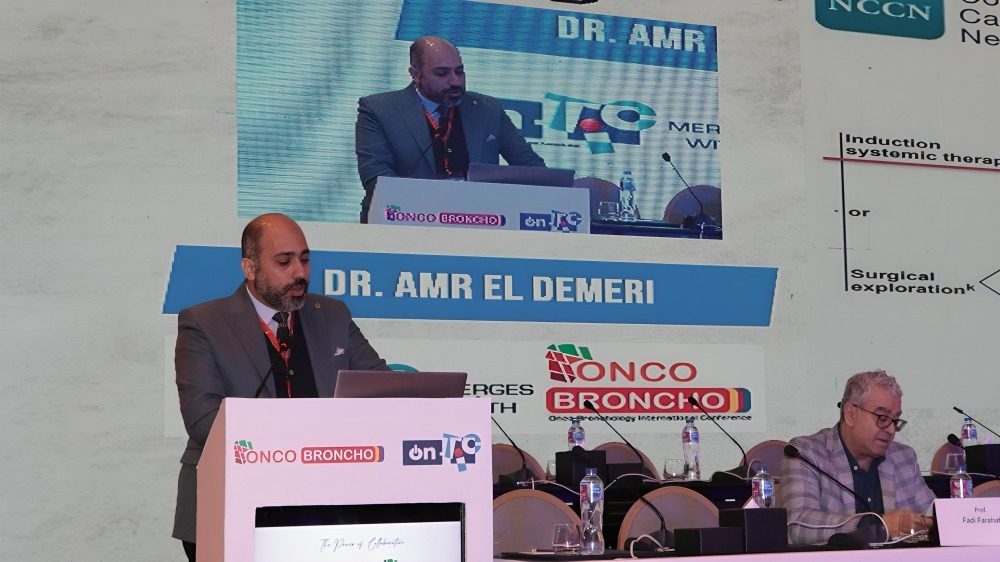At BGICC 2025, Dr. Amr El Demeri spoke about improving surgical outcomes as a component of multimodal treatment for mesothelioma. He highlighted how patient selection, surgical expertise, and integration with other therapies are key factors in achieving better outcomes.
Below are the key points from his talk:
1. Role of Surgery in Multimodal Treatment:
Surgery remains a cornerstone of mesothelioma management. Complete macroscopic resection is the goal, but its success depends on careful selection criteria based on disease distribution, patient fitness, and experience with surgical techniques.
2. Patient Selection and Prognostic Factors:
- Clinical factors such as age, comorbidities, anemia, and pulmonary function play a vital role in determining surgical candidacy.
- Preoperative assessments, including echocardiography, pulmonary function tests, and imaging, are essential to evaluate patient fitness and predict postoperative outcomes.
- Pathological features, such as tumor thickness, nodal involvement, and histological type, also guide treatment decisions. Tumor thickness below 5 cm and negative nodal involvement were associated with significantly better survival rates.
3. Advances in Staging and Diagnostics:
- Accurate staging through advanced imaging and minimally invasive techniques, such as endobronchial ultrasound-guided biopsy (EBUS-TBNA), ensures precise diagnosis and optimal treatment planning.
- Pathological evaluation is crucial, with a focus on biomarkers like PD-L1 expression and other molecular markers, which are increasingly guiding personalized treatment approaches.
4. Surgical Techniques:
- Two primary surgical approaches, extrapleural pneumonectomy (EPP) and pleurectomy/decortication (P/D), were compared. While EPP is more extensive, P/D has shown comparable survival outcomes with reduced morbidity in selected patients.
- Innovations such as hyperthermic intrathoracic chemotherapy (HITHOC), which involves the application of heated chemotherapy post-surgery, have demonstrated promise in reducing local recurrence while minimizing systemic side effects.
5. Importance of Multidisciplinary Care:
Dr. El Demeri emphasized the need for a multidisciplinary approach, involving surgeons, oncologists, radiologists, pathologists, and social workers. This collaboration improves staging accuracy, treatment planning, and participation in clinical trials.
6. Outcome Improvements:
Centralizing care in high-volume centers with experienced teams leads to improved patient outcomes. Careful patient selection remains the cornerstone of success, ensuring those who undergo surgery benefit most.
Conclusion:
Surgery, when integrated into a multimodal treatment plan and guided by precise staging, patient selection, and expertise, remains a critical tool in managing mesothelioma. Dr. Amr El Demeri’s presentation underscored the importance of advancing surgical techniques, multidisciplinary collaboration, and innovative therapies to improve outcomes for this challenging disease.
Further Reading:
Highlights from the 17th BGICC: Day 1 of Breast-Gynecological International Cancer Conference
How Egypt is closing the gap in breast cancer care: Dr. Hesham El-Ghazaly leads the conversation
Debate Highlights by Julie Gralow: Is There a Role for Immunotherapy in Early-Stage TNBC?
Scientific Insights from Prof. Hope Rugo: Advancements in Metastatic HER2+ Breast Cancer Therapy


